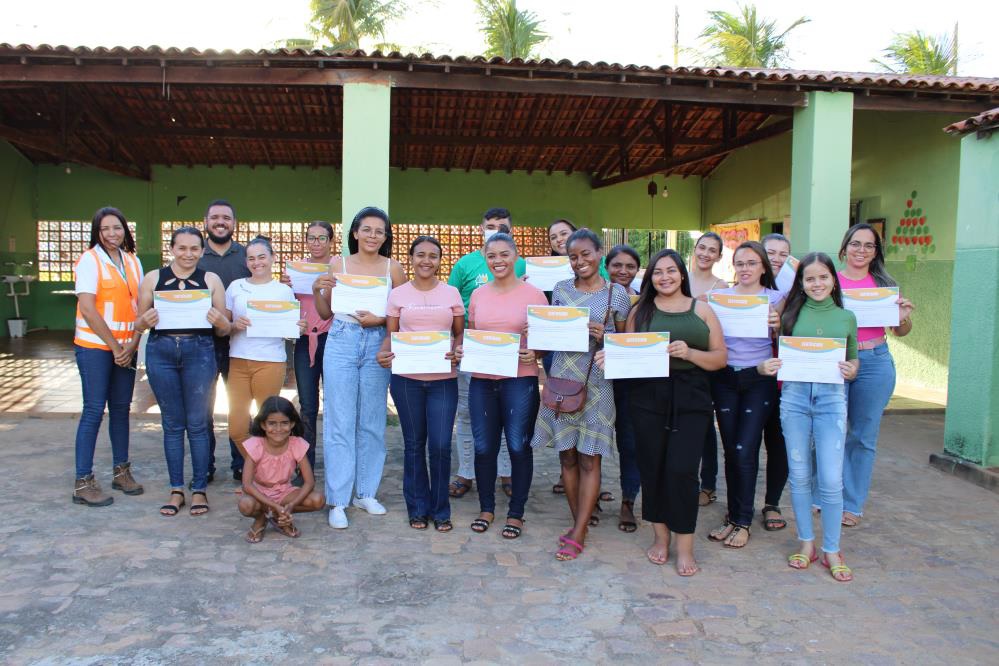Neoenergia Oitis shares

The Neoenergia Oitis Wind Complex is located in the states of Piauí and Bahia, where Neoenergia is carrying out transformative initiatives in these regions of northeastern Brazil. Committed to ESG (Environmental, Social and Governance) principles, aligned with the Iberdrola group's vision and the UN Sustainable Development Goals (SDGs), the company has played a key role in promoting sustainable development and enriching local communities.
Efforts focus on strengthening the connection between communities and the valuable natural and cultural resources of these regions. In addition, they seek to boost economic growth by providing significant opportunities for local residents.
Below you can find out in detail about the activities carried out and the positive impacts generated in municipalities in Piauí and Bahia.
Neoenergia stands out for its commitment to Traditional Communities. The Sumidouro Quilombola Community is located in the municipality of Queimada Nova, Piauí, near the connection bay of the Oitis Wind Farm Transmission Line.
In order to revive local tradition and strengthen the culture of the quilombola peoples, Neoenergia has been promoting accordion classes for children, young people and adults in the Sumidouro CRQ, as well as capoeira classes for the same public. The instructors were selected by the community's own residents, with the community playing a leading role. In addition to these actions, Neoenergia has already promoted Beauty Salon Assistant qualification courses in the community and is currently running the Semi-Arid Coexistence Knowledge and Practices Course with the aim of qualifying the community to develop and maintain agricultural development units.
In order to improve the quality of life of the Sumidouro Traditional Quilombola Community in relation to its surroundings, Neoenergia built a 375 m2 metal shed for the maintenance and shelter of machinery belonging to the community. It also set up a craft room to exhibit artifacts produced by the quilombolas, such as embroidery and wood art.
To encourage income generation and make the community autonomous, Neoenergia implemented a system of water mains and boreholes equipped with photovoltaic pumping, so that all the homes in the community now have water for their daily activities, solving a long-standing problem, as it was considered by many quilombolas in CRQ Sumidouro. We are currently working to complete the 3 agricultural development units, which include 3 sheepfolds with sheds already installed for the goats and sheep, which will be acquired by Neoenergia and donated to the community, a hectare of palm plantations to serve as food for the animals, as well as an irrigation system for planting palm that will be combined with other crops, such as corn, beans and watermelon, taking advantage of the location and system already in place to produce food for the community as well. With the exception of the paddocks and equipment.
Linked SDGs: 6 - drinking water and sanitation; 8 - decent work and economic growth
Linked SDGs: 7 - clean and affordable energy; 11 - sustainable cities and communities
Related SDGs: 9 - industry, innovation and infrastructure
Linked SDGs: 11 - sustainable cities and communities
The aim of this Integrated Heritage Education Program (PIEP) was to make it possible, in addition to making available support materials from museums and other heritage education experiences, manuals, theses, publications on the themes of cultural heritage, archaeology, heritage education and the Participatory Inventories of Cultural Assets of the More Education Program (IPHAN/MEC), to also see and consult the presentation slides of the Management Program, the archaeological sites identified, archaeological research in the region and assets registered with IPHAN; boards with enlarged photographs of archaeological artifacts in general from the region and from the archaeological sites highlighted and being rescued by the project, and reference drawings of nomadic hunter-gatherers and horticulturalists-ceramists and their techniques for producing utensils and tools; the aforementioned photographic and videographic records of reports and interviews with the holders of cultural assets and references in the municipality, as well as other educational resources produced in the activities that were even carried out via the virtual working groups created with the participants as a result of these actions: the Cordel WG and the Moreira Community WG.
The development of the PIEP accompanied the worsening of the COVID-19 pandemic, requiring the team to adapt to the conditions imposed by the increase in restrictive measures and isolation and social distancing, and the workshops were one of the activities most affected. In view of this situation, all heritage education was carried out remotely.
SDGs linked: 11 - sustainable cities and communities
- Good Practices in Food Services;
- Sweet and savory pies;
- IT for Young People;
- Basic Excel;
- Basic Cutting, Brushing and Moisturizing;
- Solid Waste Management;
- Entrepreneurship;
- Management of native bees;
- Basic Management of Goats and Sheep;
- Recyclable bags workshop.
Related news
2026-01-21
Alceu Valença e BaianaSystem se unem em parceria inédita para campanha de segurança na rede elétrica da Neoenergia no Carnaval
2026-01-14
Instituto Neoenergia destina mais de R$ 27 milhões em leis de incentivo para projetos sociais em 2025
2026-01-13
Neoenergia energiza último trecho da linha de transmissão Alto Paranaíba
2025-12-22
Neoenergia abre inscrições para sua primeira turma da Escola de Operadores do Centro de Operações Integradas
2025-12-19